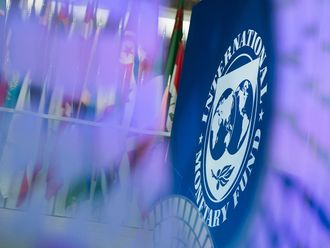New York: click Bank click sought an unusual provision in its $7.2 billion (Dh26.4 billion) mortgage-bond settlement with the US government, and seems to have ended up winning it: the bank can pay down part of its penalty by lending money to fund managers.
As part of the agreement, Germany’s largest bank has to provide $4.1 billion of relief for mortgage borrowers. Other lenders that reached similar accords with the US have also had consumer obligations, which they have usually met by easing terms on loans that they made, or that they bought.
Those banks often got credit for relief even if they no longer owned the mortgages or collected payments on them, and losses were borne by fund managers. That sparked criticism from consumer advocates who said that the borrower relief figures inflated the sense of pain that lenders truly bore in agreements over the sub-prime mortgage bonds that helped trigger the financial crisis a decade ago.
The Deutsche Bank deal seems to go one step further: it allows the German lender to finance other firms that buy nonperforming loans on the cheap and that restructure them for profit. That provision appears in two footnotes in the more than 110 pages of settlement documents, and says the bank will get credit for “financing arrangements” that it offers to other firms that can modify and make mortgages. Those firms may include private equity funds or mortgage payment collectors known as servicers.
New provision
The lender sought that provision in part because it doesn’t have retail mortgage operations in the US to supply it with soured loans, and has a strained balance sheet that makes buying billions of dollars of home loans difficult. Other banks didn’t have that language included in their agreements, including the Credit Suisse Group AG accord that the government released this week, according to a Bloomberg examination of major lenders’ settlement documents. Representatives for the Justice Department and Deutsche Bank declined to comment.
Bloomberg first reported earlier this month that the Frankfurt-based lender, looking to cut the costs of its settlement, was considering how it could meet its relief obligations in unconventional ways. The bank has had discussions about possible firms to finance, a person with knowledge of the matter said at the time.
The provision in the agreement may allow Deutsche Bank to get credit for doing business as usual, said Julia Gordon, an executive vice president at the National Community Stabilization Trust, a Washington-based non-profit that focuses on housing.
“The buyers the bank is financing should have to show that Deutsche Bank is helping them achieve better outcomes than they’d otherwise produce,” Gordon said, referring to funds and services that buy home loans in government auctions.
Crisis contributor
Deutsche Bank is already getting an easier break than most other lenders by being allowed to count consumer relief for such a large portion of its settlement, said Mark Adelson, a consultant and former chief credit officer for bond rating firm S&P Global Ratings. Because consumer relief expenses aren’t often borne directly by the bank, it’s a lighter form of penalty than a fine, he added.
About 57 per cent of the bank’s agreement was relief, compared with around 31 per cent for JPMorgan Chase & Co’s $13 billion settlement announced in November 2013.
Deutsche Bank’s final agreement was announced on Tuesday. US. Attorney General Loretta Lynch said in a statement then that “Deutsche Bank did not merely mislead investors” in its mortgage bonds, “it contributed directly to an international financial crisis.”












